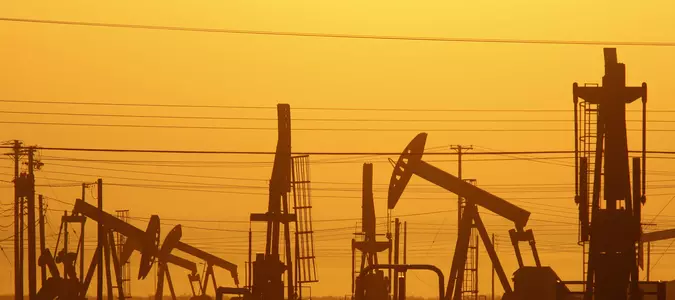

California lawmakers pass measures to expand oil production in Central Valley, restrict offshore drilling
SACRAMENTO, Calif. — In a bid to stabilize struggling crude-oil refineries, state lawmakers on Saturday passed a last-minute bill that would allow the construction of 2,000 new oil wells annually in the San Joaquin Valley while further restricting drilling along California’s iconic coastline. The measure, Senate Bill 237, was part of a deal on climate and environmental issues brokered behind ...

Pump jacks are seen at dawn in an oil field over the Monterey Shale formation near Lost Hills, California.
David McNew/Getty Images North America/TNS
SACRAMENTO, Calif. — In a bid to stabilize struggling crude-oil refineries, state lawmakers on Saturday passed a last-minute bill that would allow the construction of 2,000 new oil wells annually in the San Joaquin Valley while further restricting drilling along California’s iconic coastline.
The measure, Senate Bill 237, was part of a deal on climate and environmental issues brokered behind closed doors by Gov. Gavin Newsom, state Senate President Pro Tem Mike McGuire, a Democrat, and Assembly Speaker Robert Rivas, a Democrat. The agreement aims to address growing concerns about affordability, primarily the price of gas, and the planned closure of two of the state’s 13 refineries.
California has enough refining capacity to meet demand right now, industry experts say, but the closures could reduce the state’s refining capacity by about 20% and lead to more volatile gas prices.
Democrats on Saturday framed the vote as a bitter but necessary pill to stabilize the energy market in the short term, even as the state pushes forward with the transition from fossil fuels to clean energy.
McGuire called the bills the “most impactful affordability, climate and energy packages in our state’s history.”
“We continue to chart the future, and these bills will put more money in the pockets of hard-working Californians and keep our air clean, all while powering our transition to a more sustainable economy,” McGuire said.
The planned April 2026 closure of Valero’s refinery in Benicia will lead to a loss of $1.6 billion in wages and drag down local government budgets, said Democratic Assemblymember Lori D. Wilson, who represents the area and co-authored SB 237.
Wilson acknowledged that the bill won’t help the Benicia refinery, but said that “directly increasing domestic production of crude oil and lowering our reliance on imports will help stabilize the market — it will help create and save jobs.”
Crude oil production in California is declining at an annualized rate of about 15%, about 50% faster than the state’s most aggressive forecast for a decline in demand for gasoline, analysts said this week.
The bill that lawmakers approved Saturday would grant statutory approval for up to 2,000 new wells per year in Kern County, the heart of California oil country.
That legislative fix, effective through 2036, would in effect circumvent a decade of legal challenges by environmental groups seeking to stymie drilling in the county that produces about three-fourths of the state’s crude oil.
“Kern County knows how to produce energy,” said GOP state Sen. Shannon Grove. “We produce 80% of California’s oil, if allowed, 70% of the state’s wind and solar, and over 80% of the in-state battery storage capacity. We are the experts. We are not the enemy. We can help secure energy affordability for all Californians while enjoying the benefits of increased jobs and economic prosperity.”
Environmentalists have fumed over that trade-off and over a provision that would allow the governor to suspend the state’s summer-blend gasoline fuel standards, which reduce auto emissions but drive up costs at the pump, if prices spike for more than 30 days or if it seems likely that they will.
Some progressive Democrats voted against the bill, including Assemblymember Alex Lee, a Democrat, the chair of the Legislative Progressive Caucus. The bill, Lee said, was a “regulatory giveaway to Big Oil” that would do little to stabilize gas prices or refineries, which are struggling because demand for oil is falling.
“We need to continue to focus on the future, not the past,” Lee said.
The bill also would make offshore drilling more difficult by tightening the safety and regulatory requirements for pipelines.
Lawmakers also voted to extend cap-and-trade, an ambitious climate program that sets limits on greenhouse gas emissions and allows large polluters to buy and sell unused emission allowances at quarterly auctions. Lawmakers signed off on a 15-year extension of the program, which has been renamed “cap and invest,” through 2045.
The program is seen as crucial for California to comply with its climate goals — including reaching carbon neutrality by 2045 — and also brings in billions in revenue that helps fund climate efforts, including high-speed rail and safe drinking water programs.
Also included in the package was AB 825, which creates a pathway for California to participate in a regional electricity market. If passed, the bill would expand the state’s ability to buy and sell clean power with other Western states in a move that supporters say will improve grid reliability and save money for ratepayers.
Opponents fear that California could yield control of its power grid to out-of-state authorities, including the federal government.
















